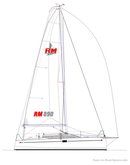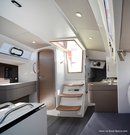RM 890 Twin keel
Sailboat specifications
The RM 890 is a 29’2” (8.9m) fast cruising sailboat designed by Marc Lombard Yacht Design Group (France). She is built since 2013 by Fora Marine (France) and RM yachts (France). The Twin keel version allows a shallower draft while maintaining performance thanks to the asymmetric fins with bulb. As a bonus beaching becomes easy and stable.
The RM 890 is as well listed, on Boat-Specs.com, in Fin keel version (see all the versions compared).
The RM 890 is as well listed, on Boat-Specs.com, in Fin keel version (see all the versions compared).
RM 890's main features
- Model
- RM 890
- Version
- Twin keel
- Hull type
- Monohull
- Category
- Fast cruising sailboat
- Sailboat builder
- Sailboat designer
- Sailboat range
- Country
- France
- Construction
- Hull and deck: plywood with glass/epoxy stratification
- First built hull
- 2013
- Last built hull
- Still in production
- Appendages
- Twin keel : twin asymmetric fin with bulb
- Helm
- Single tiller
- Rudder
- Single spade rudder (twin as option)
- Unsinkable
- No
- Trailerable
- No
- EC design categoryiThe CE design category indicates the ability to cope with certain weather conditions (the sailboat is designed for these conditions)
A: Wind < force 9, Waves < 10m
B: Wind < force 8, Waves < 8m
C: Wind < force 6, Waves < 4m
D: Wind < force 4, Waves < 0,5m - B
- Standard public price ex. VAT (indicative only)
- About96 500 €(2020)
RM 890's main dimensions
- Hull length
- 29’ 2”8.9 m
- Waterline length
- 28’ 11”8.8 m
- Beam (width)
- 11’ 2”3.42 m
- Draft
- 4’ 11”1.5 m
- Mast height from DWL
- 45’ 11”14 m
- Light displacement (MLC)
- 7055 lb3200 kg
- Maximum displacement (MLDC)
- 9259 lb4200 kg
- Capacity
- 2205 lb1000 kg
- Ballast weight
- 2094 lb950 kg
RM 890's rig and sails
- Upwind sail area
- 538 ft²50 m²
- Downwind sail area
- 1238 ft²115 m²
- Mainsail area
- 269 ft²25 m²
- Genoa area
- 269 ft²25 m²
- Staysail area
- 151 ft²14 m²
- Asymmetric spinnaker area
- 969 ft²90 m²
- IiFore triangle height (from mast foot to fore stay top attachment)
- 40’ 1”12.22 m
- JiFore triangle base (from mast foot to bottom of forestay)
- 11’ 7”3.54 m
- PiMainsail hoist measurement (from tack to head)
- 37’ 1”11.3 m
- EiMainsail foot measurement (from tack to clew)
- 12’ 6”3.8 m
- Rigging type
- Sloop Marconi 9/10
- Mast configuration
- Deck stepped mast
- Rotating spars
- No
- Number of levels of spreaders
- 1
- Spreaders angle
- Swept-back
- Spars construction
- Aluminum spars (carbon fiber spars as an option)
- Standing rigging
- 1x19 strand wire continuous
RM 890's performances
- HN (French rating)iHN or "Handicap Nationale" is an empirical rating system used in France allowing various monohulls, of different sizes and designs, to race each other fairly. It is particularly suitable for cruiser and cruiser-racer. Therefore, by comparing these values, we can have an indication of the relative speed of 2 boats.
- 21.0
- Upwind sail area to displacementiThe ratio sail area to displacement is obtained by dividing the sail area by the boat's displaced volume to the power two-thirds.
The ratio sail area to displacement can be used to compare the relative sail plan of different sailboats no matter what their size.
Upwind: under 18 the ratio indicates a cruise oriented sailboat with limited performances especially in light wind, while over 25 it indicates a fast sailboat. - 248 ft²/T23.03 m²/T
- Downwind sail area to displacementiThe ratio sail area to displacement is obtained by dividing the sail area by the boat's displaced volume to the power two-thirds.
The ratio sail area to displacement can be used to compare the relative sail plan of different sailboats no matter what their size. - 570 ft²/T52.96 m²/T
- Displacement-length ratio (DLR)iThe Displacement Length Ratio (DLR) is a figure that points out the boat's weight compared to its waterline length. The DLR is obtained by dividing the boat's displacement in tons by the cube of one one-hundredth of the waterline length (in feet).
The DLR can be used to compare the relative mass of different sailboats no matter what their length:
a DLR less than 180 is indicative of a really light sailboat (race boat made for planning), while a DLR greater than 300 is indicative of a heavy cruising sailboat. - 133
- Ballast ratioiThe Ballast ratio is an indicator of stability; it is obtained by dividing the boat's displacement by the mass of the ballast. Since the stability depends also of the hull shapes and the position of the center of gravity, only the boats with similar ballast arrangements and hull shapes should be compared.
The higher the ballast ratio is, the greater is the stability. - 30 %
- Critical hull speediAs a ship moves in the water, it creates standing waves that oppose its movement. This effect increases dramatically the resistance when the boat reaches a speed-length ratio (speed-length ratio is the ratio between the speed in knots and the square root of the waterline length in feet) of about 1.2 (corresponding to a Froude Number of 0.35) . This very sharp rise in resistance, between speed-length ratio of 1.2 to 1.5, is insurmountable for heavy sailboats and so becomes an apparent barrier. This leads to the concept of "hull speed".
The hull speed is obtained by multiplying the square root of the waterline length (in feet) by 1.34. - 7.20 knots
RM 890's auxiliary engine
- Engine(s)
- 1 inboard engine
- Engine(s) power (min./max.)
- 12 HP / 20 HP
- Fuel type
- Diesel
- Fuel tank capacity
- 15.9 gal60 liters
RM 890's accommodations and layout
- Cockpit
- Open aft cockpit
- Cabin(s)
- 2
- Berth(s) (min./max.)
- 4 / 6
- Head(s)
- 1
- Freshwater tank capacity
- 31.7 gal120 liters
- Galley headroom
- 5’ 5”1.65 m
RM 890's saloon
- Maximum headroom
- 5’ 10”1.76 m
- Saloon table length
- 4’ 5”1.33 m
- Saloon table width
- 3’ 4”1 m
- Berth length
- 6’ 7”2 m
- Chart table
- 2’ 5”0.72 m x 1’ 7”0.5 m
- Berth width
- 2’ 7”0.8 m
RM 890's fore cabin
- Berth length
- 6’ 2”1.9 m
- Berth width (head/feet)
- 5’ 11”1.8 m / 2’ 1”0.64 m
RM 890's aft cabin
- Berth length
- 6’ 7”2 m
- Berth width (head/feet)
- 3’ 10”1.15 m / 3’ 4”1 m



Fora Marine RM 890 sailplan - - 2/15
Picture extracted from the commercial documentation © Fora Marine
Picture extracted from the commercial documentation © Fora Marine



Fora Marine RM 890 sailing - - 4/15
Picture extracted from the commercial documentation © Fora Marine
Picture extracted from the commercial documentation © Fora Marine


Fora Marine RM 890 sailing - - 5/15
Picture extracted from the commercial documentation © Fora Marine
Picture extracted from the commercial documentation © Fora Marine


Fora Marine RM 890 sailing - - 6/15
Picture extracted from the commercial documentation © Fora Marine
Picture extracted from the commercial documentation © Fora Marine


Fora Marine RM 890 sailing - - 7/15
Picture extracted from the commercial documentation © Fora Marine
Picture extracted from the commercial documentation © Fora Marine


Fora Marine RM 890 sailing - - 8/15
Picture extracted from the commercial documentation © Fora Marine
Picture extracted from the commercial documentation © Fora Marine


Fora Marine RM 890 sailing - - 9/15
Picture extracted from the commercial documentation © Fora Marine
Picture extracted from the commercial documentation © Fora Marine


Fora Marine RM 890 sailing - - 10/15
Picture extracted from the commercial documentation © Fora Marine
Picture extracted from the commercial documentation © Fora Marine


Fora Marine RM 890 interior and accommodations - - 11/15
Picture extracted from the commercial documentation © Fora Marine
Picture extracted from the commercial documentation © Fora Marine


Fora Marine RM 890 interior and accommodations - - 12/15
Picture extracted from the commercial documentation © Fora Marine
Picture extracted from the commercial documentation © Fora Marine


Fora Marine RM 890 interior and accommodations - - 13/15
Picture extracted from the commercial documentation © Fora Marine
Picture extracted from the commercial documentation © Fora Marine


Fora Marine RM 890 interior and accommodations - - 14/15
Picture extracted from the commercial documentation © Fora Marine
Picture extracted from the commercial documentation © Fora Marine


Fora Marine RM 890 detail - - 15/15
Picture extracted from the commercial documentation © Fora Marine
Picture extracted from the commercial documentation © Fora Marine
Similar sailboats that may interest you:
Sailboats
First built hull
Hull length
1992
26’ 2”7.99 m
1998
34’ 5”10.47 m
2003
39’ 4”11.99 m
2012
27’ 5”8.35 m
2015
39’ 10”12.12 m
2016
31’ 8”9.65 m
2017
32’9.75 m
2016
32’ 2”9.8 m
2017
44’ 11”13.68 m
2015
29’ 1”8.88 m
2015
29’ 1”8.88 m
2013
29’ 2”8.9 m
2013
30’9.14 m
2015
35’ 1”10.69 m
1997
31’ 2”9.5 m